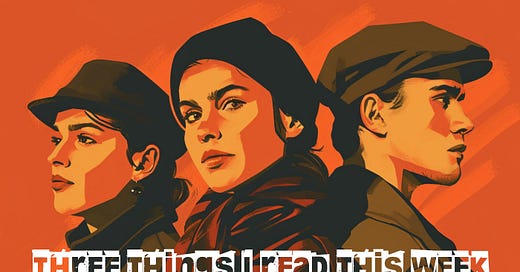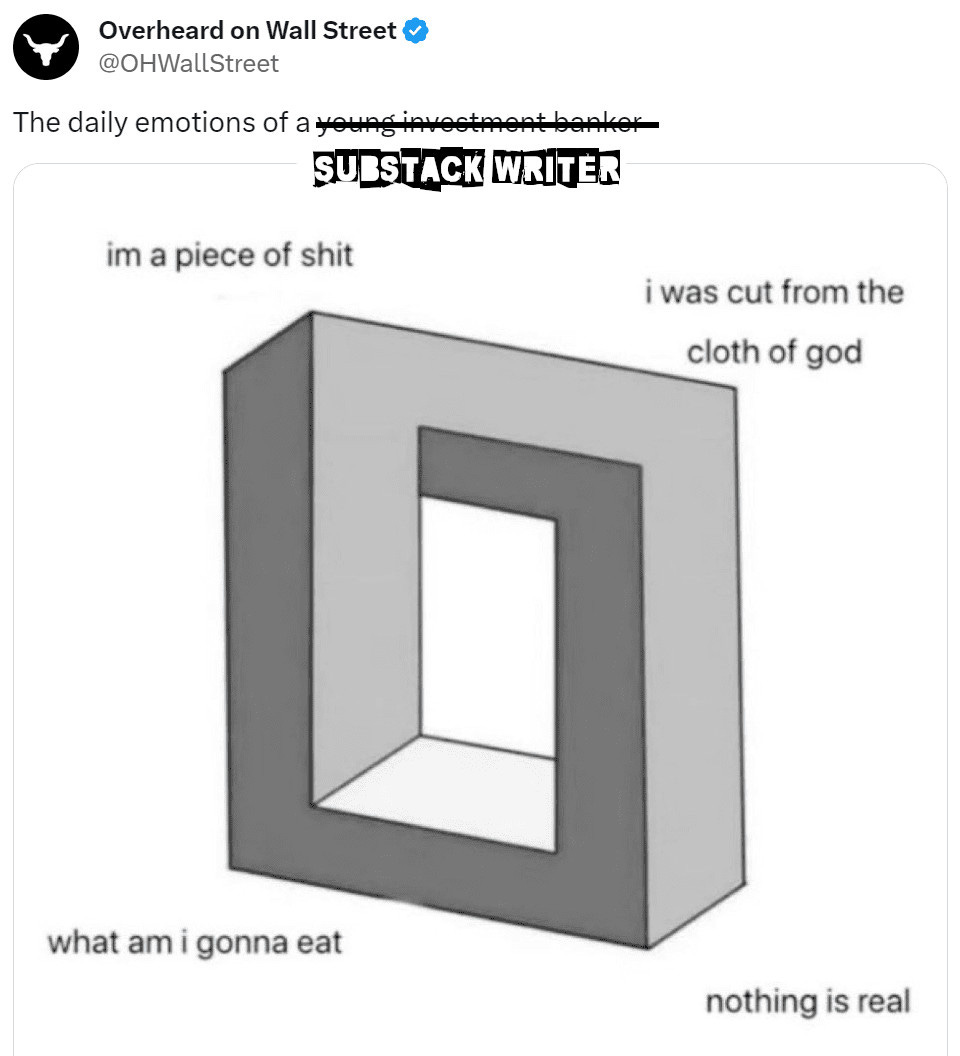Three things I read this week
The Mary Sue, beautiful cadence, the cinema
A Mary Sue is a perfect character in literature or film. A woman (or less commonly in today’s Hollywood, a man) who has no lessons to learn because they already know everything. They are a master of every skill on the first attempt. Preternaturally gifted, the Mary Sue exists outside the tedium of failure and human fallibility. ChatGPT explains it like this.
Mary Sues are often criticized for being too flawless, lacking realistic flaws or challenges, and receiving disproportionate attention or admiration within the story. These characters may have an unrealistic combination of skills, talents, or traits that make them stand out in a way that can be distracting or disrupt the narrative's believability.
Mary Sues happen because...
An inept writer hasn’t heard of character development.
Ideology! A woman cannot be flawed because that would be sexist. Women are stunning and amazing at everything, so much better than men! They instantly conquer the world because ovaries.
Most people don’t relate to a Mary Sue because her perfection makes her exist outside the natural order of things. What person is amazing at everything all the time? How boring! Rey Palpatine & Captain Marvel are the two most prominent examples of the Mary Sue. These ladies share all the character qualities of a flavorless toothpick. They have no arcs, learn no lessons, their perfection is blinding. The Mary Sue is Jesus in 16:9 aspect ratio, but without the humility.
We’ll continue this theme below…
1 - Mariko
At least when a banana is rotten somebody throws it out. The Hollywood hacks who continue to vomit the Mary Sue into our living room are just as decrepit as old fruit but they lack the self-respect to see themselves out; preferably into an entry level position at the glue factory.
The infallible Mary Sue is proof positive of the long suspected conspiracy that the average IQ in a room goes down by eight points whenever a Hollywood writer steps through the door.
Where’s all this bitterness coming from? Frustration! I’ve been reading Shogun for several months now (it’s a hefty book that requires breaks) and I’ve been following Mariko’s character arc closely. She is so well-written! I care about this fictional woman from a fifty-year-old book more than my neighbor with the barking dog who wakes me up at 2 am. It’s great to feel for Mariko, but also frustrating because her arc proves that it’s possible to write a strong female character without turning her into a flavorless mop. Hollywood take note!
Beautiful Mariko whose father betrayed his lord so now she lives in shame. Mariko whose son has a deformed hand and cannot train with a sword. Mariko who’s married to a brute she’s grown to despise. Mariko whose soul is ripped between her religion and the heretical man she loves. We relate to characters because of their hardships, we love characters because they overcome those hardships.
An obstacle makes a woman or man yet the oxygen wasting Hollywood bilge rats, thousand-gendered Lucifer spawn of the cringe-y-verse, are so hopelessly inept that they wouldn’t understand a great story if you taped it to their medicine cabinet and locked them in the bathroom for thirty-six hours. They are anti-talent and anti-human, the intellectual equal of crusty ant jizzum.
Anyways!
Deep in Shogun (spoiler alert) we turn the page on Mariko preparing to commit seppuku. One thousand pages of plot progression have brought us to the precipice where Mariko is duty bound to do the unthinkable. She prepares with a warrior’s bravery…
He watched her leave the ladies and go to the crimson square and kneel in the center, in front of the tiny white cushion. Her right hand brought out her stiletto dagger from her white obi and she placed it on the cushion in front of her. Chimmoko came forward and, kneeling too, offered her a small, pure white blanket and cord. Mariko arranged the skirts of her kimono perfectly, the maid helping her, then tied the blanket around her waist with the cord. Blackthorne knew this was to prevent her skirts being blooded and disarranged by her death throes.
Then, serene and prepared, Mariko looked up at the castle donjon. Sun still illuminated the upper story, glittering off the golden tiles. Rapidly the flaming light was mounting the spire. Then it disappeared.
She looked so tiny sitting there motionless, a splash of white on the square of crimson.
Already the avenue was dark and servants were lighting flares. When they finished, they fled as quickly and as silently as they had arrived.
She reached forward and touched the knife and straightened it. Then she gazed once more through the gateway to the far end of the avenue but it was as still and as empty as it had ever been. She looked back at the knife.
“Kasigi Yabusama!”
“Yes, Toda-sama?”
“It seems Lord Kiyama has declined to assist me. Please, I would be honored if you would be my second.”
“It is my honor,” Yabu said. He bowed and got to his feet and stood behind her, to her left. His sword sang as it slid from its scabbard. He set his feet firmly and with two hands raised the sword. “I am ready, Lady,” he said.
“Please wait until I have made the second cut.”
Her eyes were on the knife. With her right hand she made the sign of the cross over her breast, then leaned forward and took up the knife without trembling and touched it to her lips as though to taste the polished steel. Then she changed her grip and held the knife firmly with her right hand under the left side of her throat…
I read this scene three times.
What fortitude, what courage! I’d say that the Hollywood hacks aspire to write this well one day, but who are we kidding… In their own minds they’re already perfect. So be it. I shall continue to dismiss their stories and seek out tragedy and triumph where it still exists.
2 - Cadence
The cadence of this brief passage is so good!
3 - Shoes to fill
She has shoes to fill. Not to mention drawers. The last time I saw Lady Jaquelyn she had moved out of clothes altogether and into tarpaulins. Awnings. The whole affair calls up images you'd rather not entertain. Her great hummocky fundament wobbling away down the street like a sack of cats headed for the river. You just dont want to think about it. Flailing about in that tentlike lingerie. Like an actor struggling to find his way back through the curtain. Snufflings. Cries of discovery. Just the boldness of it takes your breath.
The Passenger, by Cormac McCarthy
4 - The cinema
I’ve found another film critique channel to keep my brain functioning goodly! Rather uninspiring, isn’t it though, that the quality of our modern media is such that I’ll watch a three-hour critique of a film I wouldn’t touch in its original form if it was the only choice on the airplane and I was flying from Singapore to Newark.
The upshot of Hollywood going to hell in a handbasket is that I’m getting an undergrad’s degree in cinema interpretation. I was particularly struck by this fiery dialogue near the end of the video.
Cinema at it’s best is an art form. - We though, are unfortunate enough to be living through an exceptionally shit for film, and cinema, and storytelling generally. We live in an age that obssesses about my truth and my story, yet has absolutely no regard for truth in general or for story as an art form. We live in a navel gazing society, that’s far more interested in destroying than it is in creating.
And because we have very little interest in creating, we demand very little of our creators, and so the culture produces nothing. This is an age in which the cinema can morph into the feelies from Brave New World. Because while stories are supposed to challenge us, to teach us, to ask questions of us - as well as to answer the questions that we ask - so much of modern society isn’t interested in any of these things. This is in part responsible for the decline of true cinematic heroes.
If you enjoyed this manifesto against Hollywood ignorance then someone else might too. Share the good word, let’s put an end to Mary Sues forever!










"We live in an age that obssesses about my truth and my story, yet has absolutely no regard for truth in general or for story as an art form."
yes. ... yes.
Spoiler alert:
Mariko doesn’t commit sepuko, but her death is even more meaningful...
Read “King Rat” next. Or “Noble house”. Clavell is a wizard.
I’m so jealous (in a good way, if that makes sense) when someone reads a book I LOVE for the first time!
Savor it.